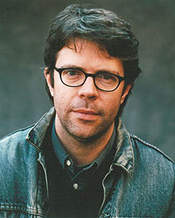I first heard one of my now favorite Christmas stories on
NPR on Christmas Eve, ten years ago. I was driving home from work, and let's
just say I was not in a receptive mood for any nonsense about sweetness and
light. Don't get me wrong, working at the bookstore through the holiday is
wonderful—you get to be Santa Claus hour after hour, day after day. But after a
month of this, Santa can get tuckered out.
By six o'clock this particular Christmas Eve I was dog tired
and not at all looking forward to our usual holiday rituals of opening presents
and a big family dinner. Like Ebeneezer Scrooge, all I wanted to do was crawl
into bed, sleep and be left alone. Looking for some help in staying awake on my
20 minute drive, I turned on the radio.
The man on WUNC had a familiar Southern voice, but I
couldn't quite place it. He was telling a story, in the first person, of a
socially awkward loner named Verne who was managing a pet shop in a mall,
somewhere along an interstate in North Carolina. A runaway pregnant teenage
girl had taken to hanging out at the mall, and out of sympathy for a fellow
outcast, Verne befriended her.
I soon figured out that the voice on the radio belonged to
my friend Hillsborough writer Allan Gurganus. And
Since that long-ago drive home in 2004, Allan has performed
his marvelous tale at the bookshop at least four times. Every time he changes
the story a bit, and every time I end up reaching for something to dab my eyes.
Allan will reprise “A Fool for Christmas” at The Regulator this Friday evening
at 7:00. Simply put brothers and
sisters, Allan Gurganus can flat out Tell a story. And he knocks this one out
of the park.
The Christmas season is of course full of grand stories,
starting with the one in the Bible. Then back in 1843 a Mr Charles Dickens
penned a little story called “A Christmas Carol” that has easily stood the test
of time. If you are like most people (and like me until about 5 years ago) and
have never actually read “A Christmas Carol,” you should not deprive yourself
of this treat much longer. As good as some of the movie versions are, the book
is better.
If you have read the book, you will be intrigued by Les
Standiford's “The Man Who Invented Christmas: How Charles Dickens's A Christmas
Carol Rescued His Career and Revived Our Holiday Spirits.” It seems that after initial fame—but not yet
serious fortune—from books like “Oliver Twist” and “The Old Curiosity Shop,”
Dickens in 1843 had fallen on hard times after the disappointing sales of his
latest novels, “Barnaby Rudge” and “Martin Chuzzlewit.” Dispirited and deeply
in debt, he walked the streets of London seeking inspiration. The Christmas
ghost story that he came up with was initially turned down by his publisher (!)
but Dickens found a willing printer, and the rest, as they say, is history.
The Grinch is still great, as is “The Polar Express.”
Another of my recent favorites, Donald Hall's “Christmas at Eagle Pond “(2012)
tells a charming, truly heartwarming story of a Christmas spent at his
grandparent's farm in rural New Hampshire in 1940.
Christmas is a time of sharing. And the best holiday stories
are all about sharing, so they are, to me, an essential part of what makes
Christmas a special time. Share your favorites by reading them out out loud
with family and friends.



 But
what happens to the people who became writers because yakking and
tweeting and bragging felt to them like intolerably shallow forms of
social engagement? What happens to the people who want to communicate in
depth, individual to individual, in the quiet and permanence of the
printed word, and who were shaped by their love of writers who wrote
when publication still assured some kind of quality control and literary
reputations were more than a matter of self-promotional decibel
levels?"
But
what happens to the people who became writers because yakking and
tweeting and bragging felt to them like intolerably shallow forms of
social engagement? What happens to the people who want to communicate in
depth, individual to individual, in the quiet and permanence of the
printed word, and who were shaped by their love of writers who wrote
when publication still assured some kind of quality control and literary
reputations were more than a matter of self-promotional decibel
levels?"






